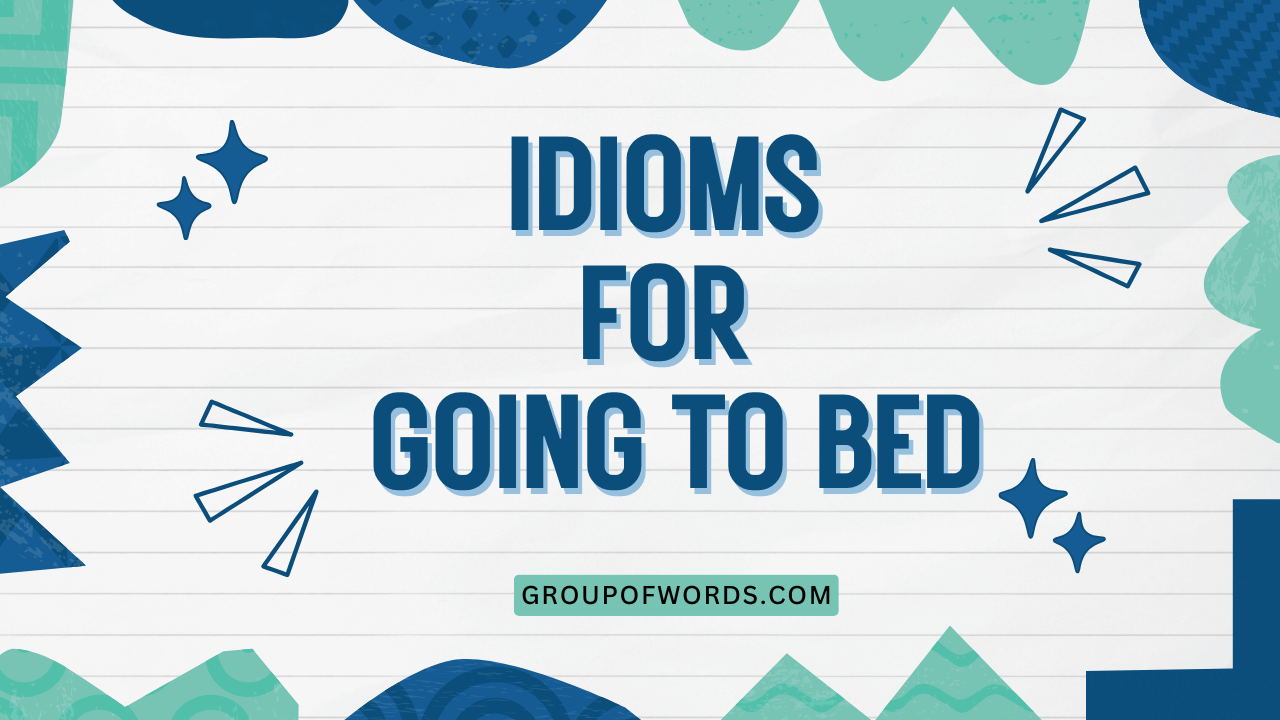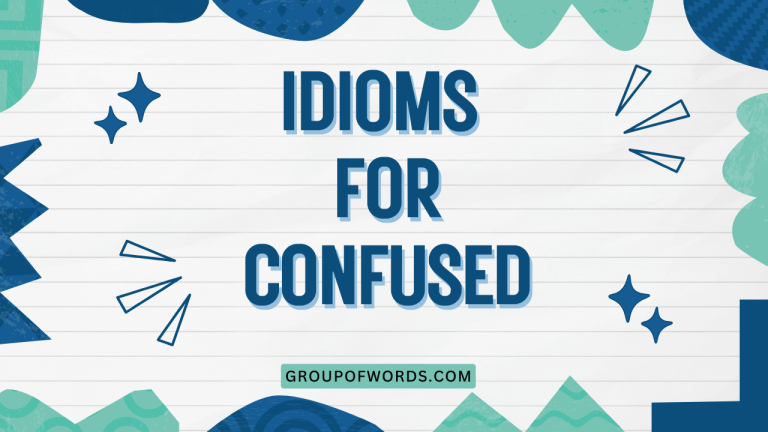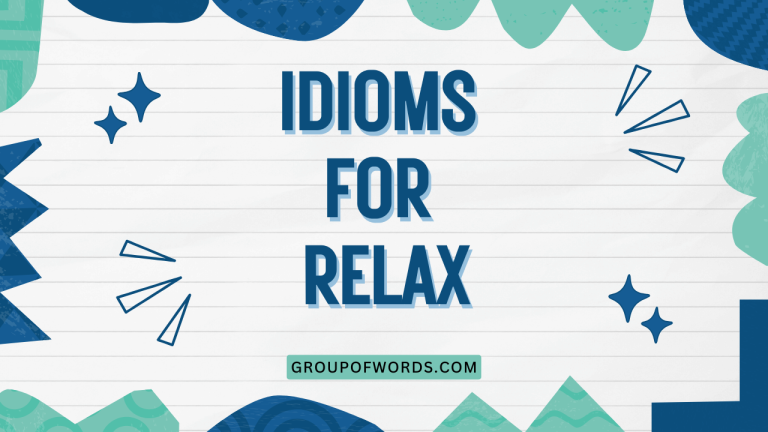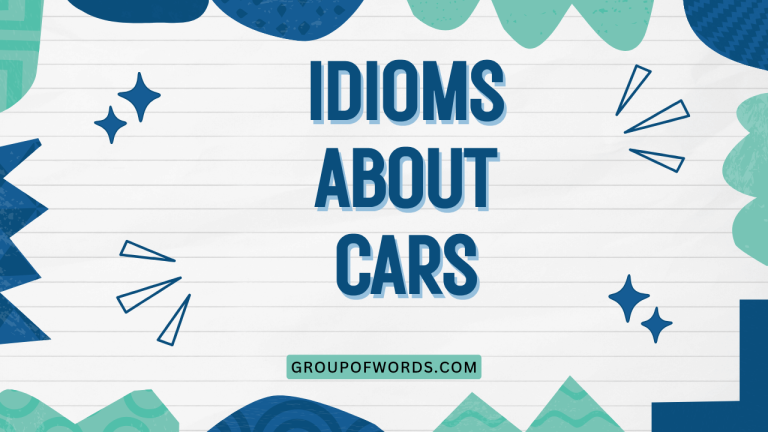Idioms for Going to Bed: A Comprehensive Guide
English idioms add color and depth to our language, making conversations more engaging and nuanced. Mastering idioms related to everyday activities, such as going to bed, can significantly improve your comprehension and fluency.
This article provides a comprehensive exploration of common idioms related to sleep and bedtime. Whether you’re an ESL learner or a native speaker looking to enrich your vocabulary, this guide will help you understand and use these expressions correctly.
We’ll cover definitions, examples, usage rules, common mistakes, and practice exercises to solidify your knowledge.
Table of Contents
- Introduction
- Definition of Idioms for Going to Bed
- Structural Breakdown
- Types and Categories of Bedtime Idioms
- Examples of Idioms for Going to Bed
- Usage Rules for Bedtime Idioms
- Common Mistakes with Bedtime Idioms
- Practice Exercises
- Advanced Topics
- FAQ
- Conclusion
Definition of Idioms for Going to Bed
An idiom is a phrase or expression whose meaning cannot be understood from the literal meanings of its individual words. Instead, it has a figurative meaning that is known through common usage.
Idioms related to going to bed are expressions that describe the act of sleeping, bedtime routines, or states of tiredness. These idioms add vividness and emotional context to simple statements about sleep, enriching communication and offering a more expressive way to convey our experiences.
These idioms often draw on metaphorical language, using imagery related to rest, night, and dreams to communicate deeper meanings about our physical and mental states. Understanding these idioms allows you to not only comprehend spoken and written English more effectively but also to express yourself with greater nuance.
From describing a peaceful slumber to struggling with insomnia, bedtime idioms capture the full spectrum of our sleep experiences.
Structural Breakdown
Bedtime idioms, like most idioms, do not follow standard grammatical rules in terms of their literal interpretation. Their structure is fixed, meaning the words cannot be changed or rearranged without altering or losing the idiom’s intended meaning.
The structure usually involves a combination of verbs, nouns, and prepositions working together to create a specific figurative meaning.
For example, the idiom “hit the hay” uses the verb “hit” and the noun “hay” to figuratively mean going to bed. The structure is not literal, as one does not actually strike hay.
The idiom’s meaning is derived from the historical context of sleeping on hay-filled mattresses. Similarly, “call it a night” uses the verb “call” and the noun “night” to signify ending an activity and going to sleep.
The structural integrity of these idioms is crucial; any alteration can render them meaningless or confusing.
Types and Categories of Bedtime Idioms
Bedtime idioms can be categorized based on the specific aspects of sleep and rest they describe. Understanding these categories can help you choose the right idiom to convey your intended meaning accurately.
Idioms Related to Falling Asleep
These idioms describe the act of transitioning from wakefulness to sleep, often emphasizing the ease or difficulty of this process. They capture the feeling of drifting off or struggling to find sleep.
Idioms Related to Tiredness
These idioms express varying degrees of fatigue, from mild weariness to extreme exhaustion. They often use vivid imagery to convey the physical and mental effects of being tired.
Idioms Related to Sleeping Well
These idioms describe a restful and peaceful sleep, often emphasizing comfort and rejuvenation. They convey the positive experience of waking up feeling refreshed.
Idioms Related to Sleeping Poorly
These idioms describe restless, disturbed, or insufficient sleep. They often highlight the negative impact of poor sleep on one’s well-being.
Idioms Related to Going to Bed Early
These idioms describe retiring to bed before the usual or expected time, often due to fatigue or illness. They can also imply a lack of social engagement.
Idioms Related to Going to Bed Late
These idioms describe staying up past the usual or expected bedtime, often due to work, social activities, or insomnia. They can also imply a disregard for routine.
Examples of Idioms for Going to Bed
Below are several examples of idioms related to going to bed, categorized for clarity. Each example includes the idiom, its meaning, and example sentences to illustrate its usage.
Table 1: Idioms Related to Falling Asleep
| Idiom | Meaning | Example Sentence |
|---|---|---|
| Hit the hay/sack | Go to bed | I’m exhausted; I’m going to hit the hay. |
| Turn in | Go to bed | It’s getting late; I think I’ll turn in. |
| Call it a night | Decide to stop an activity and go to bed | After working for 12 hours, I decided to call it a night. |
| Crash out | Fall asleep quickly and deeply | I was so tired that I crashed out as soon as my head hit the pillow. |
| Drift off | Gradually fall asleep | I drifted off while reading my book. |
| Drop off | Fall asleep, often unintentionally | He dropped off during the movie. |
| Nod off | Fall asleep briefly and unintentionally | I nodded off in the middle of the meeting. |
| Be out like a light | Fall asleep very quickly and deeply | The children were out like a light after their busy day. |
| Catch some Z’s | To sleep or get some sleep. | I’m going to catch some Z’s before the big game tomorrow. |
| Turn in for the night | Go to bed for the night. | After a long day of traveling, we decided to turn in for the night. |
| Go nighty-night | A childish way of saying goodnight and going to bed. | Okay, kids, time to go nighty-night! |
| Retire for the night | Go to bed, often used in a formal or old-fashioned way. | After the grand ball, the guests began to retire for the night. |
| Get some shut-eye | Get some sleep. | I need to get some shut-eye before my early morning flight. |
| Go to the land of Nod | Go to sleep (a humorous or literary expression). | Time to go to the land of Nod; see you in the morning! |
| Off to dreamland | Going to sleep and dreaming. | I’m off to dreamland now; goodnight! |
| Hit the pillow | Go to bed. | I’m so tired; I can’t wait to hit the pillow. |
| Turn down the covers | Prepare to go to bed (often implies getting into bed). | I’m going to turn down the covers and read for a bit. |
| Tuck oneself in | To make oneself comfortable in bed, often implying a sense of security. | She tucked herself in and closed her eyes. |
| Be off to bed | Going to bed. | I’ll be off to bed now; goodnight everyone! |
| Say goodnight to the world | Go to sleep (often implies a sense of finality or exhaustion). | I’m so tired, I just want to say goodnight to the world. |
| Kiss the sandman | Go to sleep (a whimsical or poetic expression). | Time to kiss the sandman and have sweet dreams! |
| Pull the covers over one’s head | Go to sleep, often to avoid something or someone. | He was so overwhelmed that he just wanted to pull the covers over his head. |
| Under the covers | In bed, ready to sleep. | I’m already under the covers, ready for a good night’s sleep. |
The idioms listed above provide a colorful way to describe the act of falling asleep, each with its own unique nuance and connotation.
Table 2: Idioms Related to Tiredness
| Idiom | Meaning | Example Sentence |
|---|---|---|
| Dead tired | Extremely tired | After the marathon, I was dead tired. |
| Dog-tired | Extremely tired | I’m dog-tired after working all day. |
| Worn out | Very tired; exhausted | The children were worn out after playing in the park. |
| Beat | Very tired | I’m completely beat after the long flight. |
| Burned out | Exhausted from overwork or stress | She was burned out from working too many hours. |
| Running on fumes | Continuing to function despite being extremely tired | I’m running on fumes today after only getting a few hours of sleep. |
| Ready to drop | Extremely tired and about to collapse | I’m so tired, I’m ready to drop. |
| Dragging one’s feet | Walking or moving slowly due to tiredness | He was dragging his feet because he was so tired. |
| Sleepyhead | A person who is very sleepy or likes to sleep a lot | Wake up, sleepyhead, it’s time for school! |
| Out on one’s feet | Extremely tired and weak | After the illness, she was out on her feet for weeks. |
| Feeling the weight of the world | Feeling extremely burdened and tired, both physically and mentally. | He’s been feeling the weight of the world lately due to work stress. |
| Shattered | Extremely tired or exhausted. | I’m absolutely shattered after that workout. |
| Knackered | Very tired (British English). | I’m completely knackered after helping my friend move. |
| All in | Completely exhausted. | After running the marathon, I was all in. |
| Bushed | Tired or worn out. | I’m completely bushed after that hike. |
| Pooped | Very tired. | I’m so pooped; I need a nap. |
| Flagging | Losing energy and becoming tired. | I started flagging towards the end of the race. |
| Drained | Feeling completely emptied of energy. | I feel completely drained after that stressful meeting. |
| Run ragged | Made extremely tired by being forced to work hard or do a lot of things. | The kids have been running me ragged all day. |
| Running on empty | Continuing to function despite being extremely tired or lacking resources. | I’m running on empty, but I have to finish this project. |
| Unable to keep one’s eyes open | Extremely tired and struggling to stay awake. | I was so tired that I was unable to keep my eyes open. |
| Sleep-deprived | Lacking the necessary amount of sleep. | I’m so sleep-deprived that I can barely function. |
| Sleepy-eyed | Having eyes that look tired or sleepy. | She looked sleepy-eyed as she stumbled into the kitchen. |
These idioms vividly describe various states of tiredness, from mild fatigue to complete exhaustion. They add emotional weight to simple statements about being tired.
Table 3: Idioms Related to Sleeping Well
| Idiom | Meaning | Example Sentence |
|---|---|---|
| Sleep like a log | Sleep very soundly | I slept like a log last night. |
| Sleep like a baby | Sleep very peacefully | She slept like a baby after the long journey. |
| Get a good night’s sleep | Have a restful and sufficient sleep | I need to get a good night’s sleep before the exam. |
| Sleep soundly | Sleep deeply and peacefully | He slept soundly through the storm. |
| Sleep tight | Sleep well (often used as a parting phrase) | “Sleep tight,” the mother said to her child. |
| Rest easy | Sleep peacefully without worries | After a difficult day, I could finally rest easy. |
| Have sweet dreams | Have pleasant dreams (often used as a parting phrase) | “Have sweet dreams,” she whispered. |
| Wake up refreshed | Wake up feeling rested and rejuvenated | I always wake up refreshed after a good night’s sleep. |
| Drift off to dreamland | Fall asleep easily and have pleasant dreams | She drifted off to dreamland with a smile on her face. |
| Be in the arms of Morpheus | Be asleep (a literary or poetic expression). | He was in the arms of Morpheus, dreaming peacefully. |
| Have a restful slumber | Have a peaceful and restorative sleep. | I hope you have a restful slumber tonight. |
| Sleep the sleep of the just | Sleep soundly because one has a clear conscience. | After helping the community, he could sleep the sleep of the just. |
| Be out for the count | To be sleeping very deeply. | He was out for the count after taking the medicine. |
| Sleep like a top | Sleep very soundly. | She sleeps like a top every night. |
| Have forty winks | Have a short nap. | I’m going to have forty winks before dinner. |
| Sleep without a care in the world | Sleep peacefully without any worries or concerns. | He slept without a care in the world after finishing his project. |
| Be dead to the world | Be sleeping very deeply and unaware of what is happening around you. | She was dead to the world and didn’t hear the storm. |
| Have a good snooze | Have a pleasant and restful sleep. | I’m looking forward to having a good snooze this weekend. |
| Recharge one’s batteries | Rest and regain energy. | I need to recharge my batteries with a good night’s sleep. |
| Wake up on the right side of the bed | Wake up in a good mood. | He must have woken up on the right side of the bed because he’s so cheerful today. |
| Wake up bright-eyed and bushy-tailed | Wake up feeling energetic and enthusiastic. | She woke up bright-eyed and bushy-tailed, ready to start the day. |
| Sleep the night away | Sleep through the entire night without waking up. | I was so tired that I slept the night away. |
| Hibernate | Sleep for an extended period (like an animal hibernating). | I could just hibernate through the winter. |
The idioms above convey the positive experience of restful and rejuvenating sleep. They often use imagery of peace and comfort.
Table 4: Idioms Related to Sleeping Poorly
| Idiom | Meaning | Example Sentence |
|---|---|---|
| Toss and turn | Move around restlessly in bed, unable to sleep | I tossed and turned all night. |
| Not sleep a wink | Not sleep at all | I did not sleep a wink last night. |
| Lose sleep over something | Worry about something so much that it keeps you awake | Don’t lose sleep over such a small problem. |
| Have a restless night | Experience a disturbed and uneasy sleep | I had a restless night because of the noise. |
| Be wide awake | Be fully awake and unable to sleep | I was wide awake at 3 AM. |
| Stare at the ceiling | Lie awake in bed, unable to sleep | I spent hours staring at the ceiling last night. |
| Count sheep | Try to fall asleep by imagining sheep jumping over a fence | I tried to count sheep, but it didn’t work. |
| Wake up on the wrong side of the bed | Be in a bad mood upon waking up | He woke up on the wrong side of the bed this morning. |
| Sleep with one eye open | Be alert and watchful, even while sleeping | Living in that neighborhood, you have to sleep with one eye open. |
| Sleep like a rock | Not be easily awakened by noise or disturbance (often used ironically when someone *doesn’t* sleep well). | I wish I could sleep like a rock, but I wake up at the slightest sound. |
| Have nightmares | Experience disturbing or frightening dreams. | I had nightmares after watching that scary movie. |
| Be kept awake by something | Be unable to sleep because of noise, worry, etc. | I was kept awake by the neighbor’s party. |
| Toss and fret | Move restlessly in bed and worry. | I tossed and fretted all night about the upcoming presentation. |
| Lie awake | Stay awake in bed instead of sleeping. | I lay awake for hours, thinking about my problems. |
| Be up all night | Stay awake for the entire night. | I was up all night studying for the exam. |
| Burn the midnight oil | Work or study late into the night. | I had to burn the midnight oil to finish the report. |
| Wake up in a cold sweat | Wake up suddenly feeling frightened and anxious. | I woke up in a cold sweat after having a terrible dream. |
| Have a fitful sleep | Have a restless and disturbed sleep. | I had a fitful sleep due to the heat. |
| Be haunted by nightmares | Be frequently disturbed by frightening dreams. | He was haunted by nightmares after the accident. |
| Not get any shut-eye | Not get any sleep. | I didn’t get any shut-eye last night because of the baby. |
| Tossing and turning in one’s sleep | Moving restlessly while sleeping. | I could tell he was uncomfortable because he was tossing and turning in his sleep. |
| Fighting sleep | Trying to stay awake when feeling very tired. | I was fighting sleep during the boring lecture. |
| Sleep eludes someone | Someone is unable to fall asleep. | Sleep eluded me last night because I was so worried. |
The idioms above describe the negative experiences of restless, disturbed, or insufficient sleep. They often highlight the impact of poor sleep on one’s well-being.
Table 5: Idioms Related to Going to Bed Early
| Idiom | Meaning | Example Sentence |
|---|---|---|
| Call it an early night | Decide to go to bed earlier than usual | I’m feeling unwell, so I’m going to call it an early night. |
| Retire early | Go to bed early | After the exhausting trip, we decided to retire early. |
| Turn in early | Go to bed earlier than usual | I have a busy day tomorrow, so I’m going to turn in early. |
| Hit the hay early | Go to bed early | Since I have to wake up at 5 AM, I’ll hit the hay early. |
| Go to bed with the chickens | Go to bed very early (typically at sunset) | In the countryside, people often go to bed with the chickens. |
| Take an early night | Choose to go to bed early | I’m going to take an early night to recover from my cold. |
| Be off to bed early | Going to bed earlier than usual | I’ll be off to bed early tonight because I’m not feeling well. |
| Get an early start on sleep | Begin sleeping earlier than the usual time | I want to get an early start on sleep so I feel refreshed tomorrow. |
| Make it an early night | Decide to go to bed early | Let’s make it an early night and get some rest. |
These idioms describe retiring to bed before the usual or expected time, often due to fatigue or illness.
Table 6: Idioms Related to Going to Bed Late
| Idiom | Meaning | Example Sentence |
|---|---|---|
| Burn the midnight oil | Work or study late into the night | I had to burn the midnight oil to finish the report. |
| Stay up all night | Remain awake for the entire night | We stayed up all night watching movies. |
| Pull an all-nighter | Stay up all night to work or study | I had to pull an all-nighter to finish the project. |
| Keep late hours | Regularly stay up late | He keeps late hours because of his job. |
| Be up until the wee hours | Stay awake until very late at night | We were up until the wee hours chatting. |
| Party till the cows come home | Party until very late at night | They partied till the cows came home on New Year’s Eve. |
| See the sun rise | Stay up late enough to see the sunrise. | We saw the sun rise after our camping trip. |
| Be a night owl | Someone who habitually stays up late and is active during the night. | I’m a night owl, so I do most of my work in the evening. |
| Be out on the town | Enjoying nightlife until late. | They were out on the town celebrating their anniversary. |
These idioms describe staying up past the usual or expected bedtime, often due to work, social activities, or insomnia.
Usage Rules for Bedtime Idioms
Using idioms correctly requires understanding their specific context and connotations. Here are some key rules to follow when using bedtime idioms:
- Context is Key: Always consider the context of the conversation or writing. Some idioms are more formal than others and may not be appropriate in all situations. For example, “retire for the night” is more formal than “hit the hay.”
- Figurative Meaning: Remember that idioms have a figurative meaning different from the literal meaning of the words. Avoid interpreting them literally.
- Fixed Structure: Idioms have a fixed structure, and you should not change the words or their order. Altering an idiom can make it meaningless or confusing.
- Audience Awareness: Be mindful of your audience. Some idioms may be unfamiliar to non-native speakers or people from different regions.
- Tone and Style: Use idioms to add color and expressiveness to your language, but avoid overusing them, as it can make your writing or speech sound unnatural.
- Cultural Sensitivity: Be aware that some idioms may have cultural or historical origins that are not universally understood or appreciated.
Common Mistakes with Bedtime Idioms
Using idioms incorrectly can lead to confusion or miscommunication. Here are some common mistakes to avoid:
- Literal Interpretation: Interpreting idioms literally instead of understanding their figurative meaning.
- Incorrect Word Choice: Changing the words in an idiom, which alters its meaning.
- Misunderstanding Connotations: Using an idiom in an inappropriate context due to misunderstanding its connotations.
- Overusing Idioms: Cluttering your speech or writing with too many idioms, making it sound unnatural.
Table 7: Correct vs. Incorrect Usage
| Idiom | Incorrect Usage | Correct Usage |
|---|---|---|
| Hit the hay | I will hit the grass. | I will hit the hay. |
| Call it a night | Let’s say it’s night. | Let’s call it a night. |
| Sleep like a log | Sleep like a tree. | Sleep like a log. |
| Burn the midnight oil | Light the midnight oil. | Burn the midnight oil. |
| Toss and turn | Flip and turn. | Toss and turn. |
Practice Exercises
Test your knowledge of bedtime idioms with these practice exercises.
Exercise 1: Fill in the Blanks
Complete the following sentences with the correct idiom from the list below.
(hit the hay, call it a night, sleep like a log, burn the midnight oil, toss and turn)
- I’m exhausted; I’m going to __________.
- After working for 12 hours, I think I’ll __________.
- I __________ last night because I was worried about the exam.
- I __________ to finish the report.
- I __________ last night; I didn’t even hear the thunderstorm.
Answer Key:
- hit the hay
- call it a night
- tossed and turned
- burned the midnight oil
- slept like a log
Exercise 2: Multiple Choice
Choose the correct meaning of the idiom in each sentence.
- He crashed out as soon as his head hit the pillow.
- He fell asleep quickly.
- He had an accident.
- He started crying.
- I’m running on fumes today.
- I’m driving a car.
- I’m extremely tired.
- I’m feeling energetic.
- Let’s make it an early night tonight.
- Let’s stay up late.
- Let’s go to bed early.
- Let’s have a party.
- I didn’t sleep a wink last night.
- I slept very well.
- I didn’t sleep at all.
- I had a nightmare.
- He woke up on the wrong side of the bed.
- He woke up in a good mood.
- He woke up in a bad mood.
- He woke up early.
Answer Key:
- a
- b
- b
- b
- b
Exercise 3: Matching
Match the idiom with its meaning.
| Idiom | Meaning |
|---|---|
| 1. Sleep tight | a. Go to bed very early |
| 2. Go to bed with the chickens | b. Sleep very soundly |
| 3. Be out like a light | c. Sleep well |
| 4. Sleep like a log | d. Fall asleep very quickly |
Answer Key:
- 1. c
- 2. a
- 3. d
- 4. b
Advanced Topics
For advanced learners, exploring the etymology and cultural context of idioms can provide deeper insights into their meanings and usage. Many bedtime idioms have historical roots, reflecting past customs and beliefs about sleep and rest.
For instance, the idiom “hit the hay” comes from the practice of sleeping on mattresses filled with hay. Understanding these origins can enrich your appreciation and usage of idioms.
Additionally, studying regional variations in idiom usage can further enhance your linguistic skills. While some idioms are universally understood, others may be specific to certain English-speaking countries or regions.
Being aware of these differences can help you communicate more effectively with diverse audiences.
FAQ
Q: Are bedtime idioms only used in spoken English?
A: No, bedtime idioms are used in both spoken and written English. However, the choice of idiom may depend on the formality of the context.
Q: Can I change the words in an idiom?
A: No, idioms have a fixed structure, and changing the words can alter or negate their meaning.
Q: Are some bedtime idioms more common than others?
A: Yes, some idioms, such as “hit the hay” and “call it a night,” are more frequently used and widely understood than others.
Q: How can I improve my understanding of idioms?
A: Reading extensively, listening to native speakers, and practicing using idioms in context can help improve your understanding and usage.
Q: Is it okay to use idioms in formal writing?
A: It depends on the specific idiom and the overall tone of your writing. Generally, it’s best to avoid overly casual or colloquial idioms in formal contexts.
Conclusion
Mastering idioms for going to bed can significantly enhance your English vocabulary and communication skills. By understanding their meanings, usage rules, and common mistakes, you can use these expressions confidently and accurately.
This guide has provided a comprehensive overview of various bedtime idioms, categorized for clarity and illustrated with examples. Continue practicing and exploring these colorful expressions to enrich your language and express yourself more effectively.






